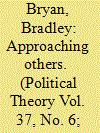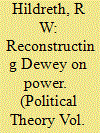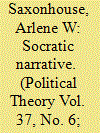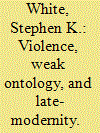| Srl | Item |
| 1 |
ID:
092140


|
|
|
|
|
| Publication |
2009.
|
| Summary/Abstract |
The essay sheds light on Aristotle's understanding of friendship and its relation to political life.The author challenges the usual view that Aristotle postulates three distinct kinds of friendship. Instead the author argues that Aristotle understood there to be only one kind of friendship, and that other "friendships" were to Aristotle "unfinished" and thus not friendship at all. Aristotle shows that the relation between friendship and politics is grounded in friendship's possibility for human beings, and not as something cherished for its actuality. By looking at proper friendship as possibility and not actuality, we could only ever interpret the infamous statement attributed to Aristotle-"my friends, there are no friends"-not as illuminating of what friendship is but rather as a nostalgic diagnosis of the decay of the possibility of friendship, and hence of politics. By extension, and more poignantly, interpreting Aristotle's work on friendship in this light, we stand ready to reinterpret the mobilization of Aristotelian friendship for contemporary understandings of democratic practice.
|
|
|
|
|
|
|
|
|
|
|
|
|
|
|
|
| 2 |
ID:
092141


|
|
|
|
|
| Publication |
2009.
|
| Summary/Abstract |
One of the most enduring criticisms of John Dewey's political thought is that it is unsuspicious of power. This essay responds to this critique by advancing the claim that power is an integral but implicit element of Dewey's conception of human experience. Given Dewey's indirect treatment of power, this essay has two primary tasks. First, it reconstructs and develops an explicit conception of power for Deweyan pragmatism. Second, it evaluates the extent that Dewey's political and social philosophy is able to criticize power relations. Taken together, I aim to provide a more coherent and realistic defense of the political dimensions of Dewey's democratic theory. This defense moves Deweyan pragmatism toward a democratic politics that neither elides conflict nor evades power.
|
|
|
|
|
|
|
|
|
|
|
|
|
|
|
|
| 3 |
ID:
092139


|
|
|
|
|
| Publication |
2009.
|
| Summary/Abstract |
Plato wrote dialogues. While there has been attention to the dramatic elements of Plato's dialogues by a number of scholars, there has been much less attention to the narrative style of the dialogues. I argue that we should consider whether the dialogues are recited or presented like dramatic works with each character speaking his own words-or as a mixture of these narrative forms. By employing this interpretive tool to read the Republic, I illustrate how paying attention to the narrative style enables us to see a democratic Socrates who undermines readings of the Republic famously offered by Karl Popper and Leo Strauss. Plato appears then as neither a defender of the "closed society" nor an advocate of the elite rule of the wise over the many.
|
|
|
|
|
|
|
|
|
|
|
|
|
|
|
|
| 4 |
ID:
092142


|
|
|
|
|
| Publication |
2009.
|
| Summary/Abstract |
This essay responds to the characterization Ted Miller offers (in his December 2008 essay in Political Theory) of the kind of nonfoundationalism I have referred to as "weak ontology," and that Gianni Vattimo frequently calls "weak thought." Miller argues that such a position embodies, first, a philosophy of history in which strong ontologies (e.g., religion) are assessed categorically as passé, and, second, are associated essentially with violence. I show that while these characterizations may be appropriate for Vattimo's thought, they are not for weak ontology as I understand it. Finally, I suggest that the former might more usefully be categorized as "antifoundationalism" and the latter as "nonfoundationalism."
|
|
|
|
|
|
|
|
|
|
|
|
|
|
|
|